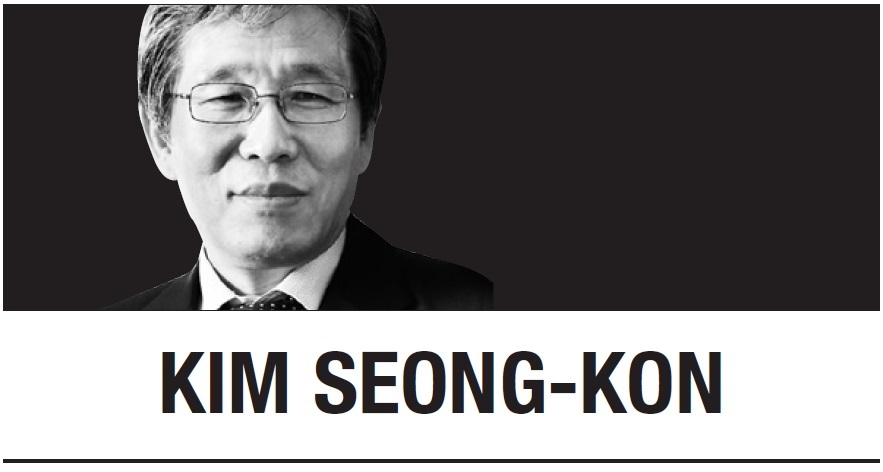[Kim Seong-kon] Joseon era of 19th century vs. 21st century Korea
By Kim Seong-konPublished : Jan. 21, 2020 - 17:35
 Many analysts and historians point out that the current political situation of South Korea resembles that of the Joseon era in the late 19th century. To say the least, it would be embarrassing and disheartening if 21st century Korea still could not overcome the traumatic situation it experienced in the late 19th century. Nevertheless, we may be able to obtain some insights and hindsight from the comparison.
Many analysts and historians point out that the current political situation of South Korea resembles that of the Joseon era in the late 19th century. To say the least, it would be embarrassing and disheartening if 21st century Korea still could not overcome the traumatic situation it experienced in the late 19th century. Nevertheless, we may be able to obtain some insights and hindsight from the comparison.In the late 19th century, Joseon, which changed its name to Korea later, was helplessly lost in a vortex of international politics among the three menacing empires, China, Japan and Russia. In response to ruthless foreign aggressions, the rulers of Joseon simply shut the door to the outside world and, therefore, were ignorant of radical changes taking place in the international community at the time. Instead of actively dealing with the external crisis that seriously threatened the kingdom, the rulers of Joseon were engaged in internal factional scuffles. As a result, the Joseon era was hopelessly going down both internally and externally and finally lost her sovereignty.
To make matters worse, the rulers of Joseon chose the wrong countries for help or as allies. In order to win the power struggle with his son and daughter-in-law, Regent Daewon-gun heavily relied on Japan, whereas King Gojong and Queen Min chose China as their patron and protector, and then Russia later. After Japan won the Sino-Japanese War, King Gojong escaped to the Russian Legation Office with the royal prince in 1896 and hid there for one long year. However, Japan occupied Korea in 1910.
Experts argue that 21st century South Korea is now facing a similar situation. The main difference is that now China is rising instead of Japan, and South Korea has to deal with a nuclear-armed North Korea. The United States, too, has entered the picture as an ally to South Korea and Japan. Once again, South Korea has to choose from those countries. If our political leaders choose a wrong nation for help or as an ally as they did in the late 19th century, our country will go down inexorably once again.
We are witnessing the omen already. As soon as South Korea’s relationship with Japan began to deteriorate, which also might have affected the South Korea-US alliance, Chinese and Russian military aircrafts flew over our territory presumably to test our reactions.
North Korea is once again threatening us with nuclear weapons. China, too, has been pressing South Korea not to allow the US army to deploy THAAD, while imposing sanctions on business and tourism. Now the US is demanding a significantly increased budget for the deployment of its troops in South Korea. To make matters worse, South Korea’s relationship with Japan is the worst it has been in decades.
These days, foreign observers are anxiously watching South Korea’s departure from the blue zone and approach the red zone, moving from an oceanic civilization to a continent civilization. Journalists abroad, too, worry about the freedom of the press and speech in South Korea, partly because of the yellow warning stickers unscrupulously given to the YouTubers who criticize the government and partly because of the self-censorship of Korean reporters and writers fearful of possible retaliations and retributions.
The foreign media is also concerned about the recent bills that passed the parliament, authorizing the government to change current election and judicial systems radically for political gain, excluding the main Opposition Party completely in the process.
The world is also watching a series of recent conflicts between the prosecution and the Ministry of Justice, which are not supposed to happen in an advanced country. When referring to its Cabinet members, the US government uses the title, “Secretary,” implying that they are like secretaries to the president, working for the president directly.
However, the Department of Justice is an exception. The US government calls the head of the Justice Department, “attorney general,” not “secretary,” because unlike other Cabinet members, the person does not carry out the president’s policies, but works rather independently, pursuing justice. Therefore, the head of the Justice Department may be in conflict with the president and even should investigate him, if necessary.
In order not to repeat the same mistakes we foolishly made in the late 19th century, we should overcome tribalism and ultranationalism, know the outside world and have allies that will come and rescue us in times of crisis. In that sense, we should value the Korea-US Defense Treaty that would surely protect South Korea from our hostile neighboring countries’ aggressions. We should know that the US government signed the Defense Treaty with only three parties: South Korea, Japan, and NATO. Without this treaty, South Korea will be extremely vulnerable to threats from the outside.
In the 19th century, our ancestors made a fatal mistake and we all paid an expensive price for it. We cannot afford another mistake in the 21st century. We should push our political leaders to choose wisely, so our country will stay on the right track and continue to prosper.
Kim Seong-kon
Kim Seong-kon is a professor emeritus of English at Seoul National University. -- Ed.


















![[Today’s K-pop] Treasure to publish magazine for debut anniversary](http://res.heraldm.com/phpwas/restmb_idxmake.php?idx=642&simg=/content/image/2024/07/26/20240726050551_0.jpg&u=)